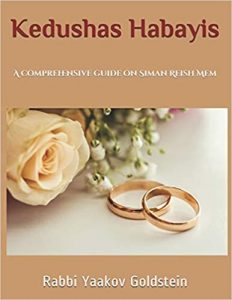*The article below is an excerpt from the above Sefer
*As an Amazon Associate I earn from qualifying purchases.
The importance and effects of a sanctified marital intimacy:
The Shlah Hakadosh writes as follows:[1] “One must guard and fulfill all the words of the Tur in O.C. 240 and E.H. 25. Do not ignore anything that is mentioned there. One must know by heart every word that is written there. Regarding the mysticism of intercourse, I command you to study chapter 17 in Reishis Chochma from beginning to end many times. My sons, I guarantee you that if you study the above two chapters in the Tur and chapter 16 in Reishis Chochma many times until you have become an expert in them and do not swerve from their words, then praised you will be in this world and the next. You will have good children with holy souls.”
A. The holiness of the Jewish people depends on this matter:
It is known that on the matter of following the laws of intimacy, and its proper sanctification, is dependent the source of the holiness of the Jewish people.[2]
B. The effect on the children:[3]
Whoever is careful to keep the detailed laws of intimacy, not only has he managed to sanctify and purify his soul, and character, but also if he has children, those children will be beautiful people and people with shame, who are fit for wisdom and piety. However, those who follow the acts of the rest of the world who walk in darkness, then he will have children just like them.
The soul level is based on the holiness of intimacy:[4] One is to know that in accordance to the state of sanctity of the intimacy, so will be drawn down the soul of his child, and if one sanctifies himself, the couple will have a child with a holy soul. If the couple intends their intimacy to become united and have the Shechina dwell in their union, and thus attach to the Shechina, then so too they will have a child who desires to attach to the Shechina.
C. Every union creates new souls:[5]
Every marital union between a husband and wife which takes place in a form of holiness creates a Jewish soul. This soul may enter the body of another child who is born, if that woman does not become pregnant with the soul that they created. It is for this reason that marital unity is permitted between a husband and wife even during times that she cannot conceive, such as during pregnancy, or after menopause. Accordingly, the Zohar explains that although Sarah was physically barren, she merited to have many spiritual children.
The children of Avraham and Sarah: This is learned from the verse which states “Vetehi Sarah Akarah, Ein Lah Velad/And Sarah was barren, she had no children.” This means that although she did not have children, she gave children to others. The explanation is as follows: The souls created by the unity of Avraham and Sarah were conceived within other women’s fetuses and born carrying that soul. The male souls created entered male fetuses, and the female souls entered female fetuses. Accordingly, although Avraham and Sarah had no physical children [until the birth of Yitzchak], they had many spiritual children which were born to babies on earth. These children who were born carrying the holy children souls of Avraham and Sarah eventually converted and became followers of Avraham and Sarah. This is the mystical meaning behind the converts that were made by Avraham and Sarah, as it refers to the souls that they created and were born into the bodies of those who eventually came to convert.
Children of these souls will be born in future:[6] Rebbe Shimon stated that a person is commanded to always be intimate with his wife [during the set Onah times], even if she cannot get pregnant, as his seed will not be going to waste. Hashem appoints an angel to guard the seed for the future where each and every one will be entered into a body and thus a man will have many children.
______________________________________________________________
[1] Shelah Shaar Haosyos “Kedusha”; Elya Raba 240
[2] Aruch Hashulchan 240:2
[3] Rambam Deios 5:5
[4] Reishis Chochma 16:4 based on Zohar Shemos 11a; Kedoshim 80a
[5] Shlah Hakadosh Lech Lecha p. 45; Chesed Leavraham [Rav Avraham Azulai] Mayan 2 Nehar 65-66; Ben Ish Chai Vayeira 1:24
[6] Chida in Midbar Kedeimos Mareches Zayin 4 p. 83 based on Zohar; Ben Ish Chai Vayeira 1:24


 Donate
Donate
Leave A Comment?
You must be logged in to post a comment.